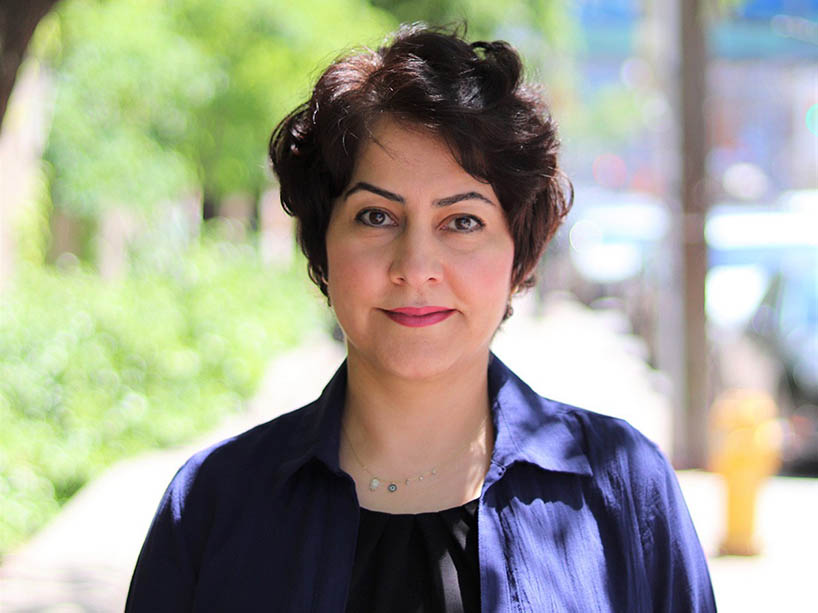TMU prof receives award for her work in making our lives safer and more efficient

Sharareh Taghipour, professor in the Faculty of Engineering and Architectural Science and Canada Research Chair in Physical Asset Management will be given the Sarwan Sahota Distinguished Scholar Award at the Toronto Met Gala on April 30. She’s spent her career looking at ways to optimize health care and industries for a safer, more sustainable and more efficient future.
Each year at TMU, the Sarwan Sahota Distinguished Scholar Award is presented to a faculty member who has made an outstanding contribution to knowledge or artistic creativity in their fields.
This year, Sharareh Taghipour, professor in the Faculty of Engineering and Architectural Science and Canada Research Chair in Physical Asset Management, is recognized for her singular work in the field.
While Taghipour’s field may seem a little mysterious at first glance, the results of her work have had wide-ranging impacts. For example, if you ever wondered right before take off how airlines maintain planes so we all stay safe, if you tried to order an appliance during COVID-19 and found products in short supply, or if you’ve ever wished patient wait times were shorter, then you’re starting to get a sense of how Taghipour’s work can be applied to optimize our daily lives.
At the Reliability, Risk and Maintenance Research Laboratory (RRMR Lab) that she runs, Taghipour is engaged in mathematical modelling and optimization, reliability engineering and smart and sustainable asset management, and she works with industry partners to streamline the processes around us.
“Like probably many people that get into the field, I was good at math,” she laughs. “I got my bachelor and master’s in Iran, and I was interested in doing optimization and using mathematical modelling to do so. Initially, I was mainly interested in health care applications.”
For her master’s work, she simulated an emergency department environment so that she might come up with scenarios to better use resources to minimize wait times.
Her focus shifted when she started her PhD at the University of Toronto.
“My supervisor was more involved in physical asset management and so he shifted my focus a little bit from health care to assets in industrial settings including machinery, but interestingly, I felt like there are a lot of similarities between physical assets and the human body.”
This line of thinking is what motivated Taghipour to help to develop a grant application for a project about breast cancer modelling. The project looked at the progression of breast cancer and the effect of various risks, to better determine when women should start and end screening, and how often the screening should be done.
Nowadays, Taghipour’s superpower remains mathematical modelling, but she’s applying it to projects where industry partners hope to forecast equipment failure to determine the best time to swap out assets so as to maximize productivity, safety and sustainability. In fact, as it stands, the world’s largest companies lose about $1 trillion per year to downed machinery (external link) .
“We have physical assets everywhere in our everyday life: appliances, computers, vehicles,” says Taghipour. “I’m mostly looking at operating assets; they’re important because if you don't do this modelling and a failure happens, it could have very negative impacts, including costs, damage to the environment, and even people’s lives.”
Failure prediction at Taghipour’s lab involves both mathematical modelling and data-driven methods. “We utilize a predict and optimize framework. Most of the data-driven methodologies we use are either statistically based or machine learning based,” she says.
For the most part, Taghipour forms industry partnerships. “Industry partners come to us because they know what we’re doing in my research lab and the topic attracts them,” she says. “They have similar problems that need solving. For example, I was in a conference presenting a topic and then someone from a company heard my talk, and the result was an international collaboration with impact.”
Collaboration in general is a big part of the work that Taghipour does. She loves looking for ways to collaborate with researchers in other disciplines, but also with students who have expertise in other realms.
For students looking to elevate their own research, Taghipour says the first and best step is to take a careful look around. “Students doing research should be looking for existing problems that can be found in every industry and society,” she says. “They have to see how their own expertise and capabilities can contribute to solving some of those problems. Sometimes you can purely solve the problem on your own, but most of the time, you’ll need an interdisciplinary approach.”
In her own research, Taghipour champions interdisciplinary relationships. By assembling multidisciplinary teams that have included optimization experts, psychologists and cyber specialists, she aims to revolutionize resource allocation and decision-making processes in high-stakes environments.
Taghipour has received numerous awards recognizing her contributions to the field, such as the Government of Ontario Early Researcher Award, the PEMAC-Maintenance Management Leadership Award and various Best Paper Awards, but being recognized by her colleagues at TMU is a special honour, she says. “I'm very honored to receive this award, and I want to attribute this recognition to my graduate students and postdoctoral fellows because of their hardwork and determination. If it weren't for them, I probably wouldn't be able to do the work that we do.”
Sarareh Taghipour will be recognized with the Sarwan Sahota Award at the Toronto Met Awards Gala on April 30, 2023.
Related stories: